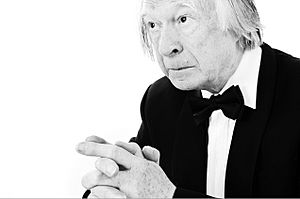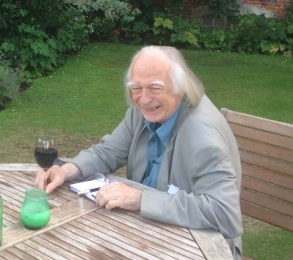Denis Noble facts for kids
Quick facts for kids
Denis Noble
|
|
|---|---|
 |
|
| Born | 16 November 1936 |
| Nationality | British |
| Education | Emanuel School |
| Alma mater | University College London (BSc, MA, PhD) |
| Spouse(s) |
Susan Jennifer Barfield
(m. 1965) |
| Children | 2 |
| Awards |
|
| Scientific career | |
| Fields |
|
| Institutions | Balliol College, University of Oxford |
| Thesis | Ion conductance of cardiac muscle (1961) |
| Doctoral advisor | Otto Hutter |
Denis Noble (born 16 November 1936) is a British scientist. He is a physiologist and biologist. He taught at the University of Oxford for many years. He is known for being one of the first people to work on systems biology. He also created the very first working computer model of the heart in 1960.
In 2014, Noble started a project called The Third Way of Evolution (TWE). This project suggests that natural selection is not the main way that evolution happens. It predicts that the current main ideas about evolution will change. However, most other scientists do not agree with these claims. The TWE project is sometimes called a "fringe movement" by other experts.
Contents
Early Life and Education
Denis Noble went to Emanuel School and then to University College London (UCL). In 1958, he started studying how the heart beats. This led to two important papers in the science journal Nature in 1960. These papers showed the first mathematical model of the heart's electrical rhythm.
He continued to develop this work with other scientists. These studies helped create the basis for how we understand the heart's electrical activity today. In 1961, he earned his PhD degree from UCL.
Amazing Heart Research
Noble's research uses computer models to understand how body organs and systems work. He looks at how things work from tiny molecules up to the whole body. His team, working with scientists from around the world, used supercomputers to create the first "virtual organ," which was a virtual heart.
From 1993 to 2001, he helped start the Physiome Project. This is an international project that uses computer models to understand how our bodies work based on our genome (our complete set of DNA). He later became the president of the International Union of Physiological Sciences.
Noble also writes about the philosophy of biology. His books, like The Music of Life and Dance to the Tune of Life, question some basic ideas in biology. They suggest that information in living things doesn't just flow in one direction.
What is Systems Biology?
In his 2006 book, The Music of Life, Noble talks about systems biology. He doesn't agree with the idea that everything about us is decided only by our genes. He explains that genes work together in groups and systems. He says that our genome is more like a set of organ pipes working together than a simple "blueprint for life."
He believes that different levels of understanding in biology are equally important. For example, what happens at the level of cells can affect what happens in a whole organ, and vice versa.
The Third Way of Evolution
Noble has said that natural selection is not the main way that evolution happens. This is different from what most evolutionary biologists believe. He has called for a new way of thinking about evolution, which he calls The Third Way of Evolution (TWE).
He argues that new research shows that traits gained during life can be passed down. He also claims that changes in genes are not always random or slow. He believes that the idea that information only flows from DNA to proteins is not always true. He thinks a new understanding of evolution will combine ideas from how our bodies work (physiology) with how living things change over time (evolutionary biology).
Noble and scientist James A. Shapiro started the TWE project in 2014. The TWE group offers a "Third Way" that is different from both creationism and the main ideas of modern evolution. TWE suggests that the current understanding of evolution will be completely replaced. Supporters of TWE point to things like how development affects evolution, how organisms change their environment, and how traits can be passed on without changing DNA.
However, many leading evolutionary biologists do not support TWE. They say there is little sign that the main ideas of evolution will be completely replaced. Some describe TWE as a "fringe movement" that is outside the main scientific view. They also say that Noble's claims about gene changes being purposeful are not supported by evidence. Most scientists believe gene changes are random.
Noble's Principles of Systems Biology
Denis Noble has suggested Ten Principles for Systems Biology:
- Living things work at many different levels.
- Information doesn't just flow in one direction in biology.
- DNA is not the only thing that passes on traits.
- There is no single "most important" level of cause and effect in biology.
- Understanding genes needs insight from higher levels of organization.
- There is no "genetic program" that controls everything.
- There are no programs at any other level either.
- There are no programs in the brain.
- The "self" (who we are) is not a simple object.
- Many more principles are still to be found; a true "theory of biology" doesn't exist yet.
Career Highlights
Denis Noble has had a long and important career. Here are some of his key roles:
- 1961–1963: Assistant lecturer in Physiology at University College London.
- 1963–1984: Fellow and tutor at Balliol College, Oxford.
- 1967–2024: Editor-in-Chief of Progress in Biophysics and Molecular Biology.
- 1984–2004: Burdon Sanderson Professor of Cardiovascular Physiology at Oxford University.
- From 2004: Emeritus professor of Cardiovascular Physiology at Oxford University.
- 2009–2017: President of the International Union of Physiological Sciences.
- From 2014: Co-founder of The Third Way of Evolution.
Awards and Honours
Denis Noble has received many awards and honours for his work.
- In 1979, he was chosen as a Fellow of the Royal Society. This is a very high honour for scientists in the UK.
- He was made an Honorary Member of the Royal College of Physicians in 1988.
- In 1998, he was awarded a CBE (Commander of the Order of the British Empire).
- In 2022, he received the Lomonosov Gold Medal, a major award from the Russian Academy of Sciences.
- He also has honorary doctorates from several universities, including the University of Sheffield and the University of Warwick.
Personal Life
Denis Noble was born in London in 1936. His parents were tailors. He enjoys playing classical guitar and singing folk songs. He has given lectures in many languages, including French, Italian, Japanese, and Korean.
 | DeHart Hubbard |
 | Wilma Rudolph |
 | Jesse Owens |
 | Jackie Joyner-Kersee |
 | Major Taylor |


